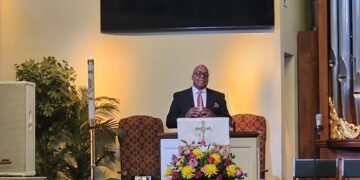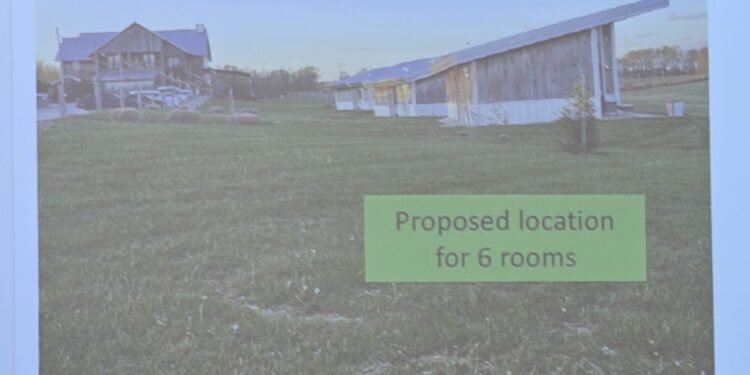The Henderson County Board of Zoning Adjustments Monday evening paused a decision on an appeal from Robards restaurant Farmer & Frenchman, which had asked for a zoning interpretation that would allow it to build a six-unit bed and breakfast on its property.
The county BOZA sought to have the findings of fact and other information gleaned from the meeting transcribed and reviewed before a Dec. 1 meeting, when the body will reconvene in a called meeting for the vote.
The decision to pause came after nearly two hours of public hearing in which supporters of Farmer & Frenchman argued that it is a small farm winery and according to language in the Kentucky Revised Statutes, it is exempt from planning and zoning processes because it is located on land zoned agriculture.
F&F in August filed for a building permit for a six-unit bed & breakfast, but County Codes Administrator Randy Tasa denied the request, citing in an October letter that approving it—without going through the normal planning and zoning process—could allow businesses with focuses such as solar panels, wind turbines, battery energy storage systems, adult-themed entertainment and manufacturing to set up shop on land where agriculture already occurs without any oversight from local officials.
Henderson County Attorney Steve Gold argued in support of Tasa and said that allowing F&F to build without going through the planning and zoning process “would turn every bit of planning and zoning on its head.”
Gold said allowing the business to bypass planning and zoning proceedings puts in place a precedent that would allow other owners of agricultural land to set up businesses on their land without going through the planning and zoning process.
“If we were to adopt this logic, what’s to stop somebody from opening next… welcome to Bob’s Farm and Strip Club,” Gold said.
Steve Arnett, the attorney representing F&F, balked at those arguments, saying that F&F’s application is not for anything like that and “this is agriculture use that should be allowed (because of) state statute.”
Throughout the evening, Arnett made the case that F&F is exempt according to state regulations. He said that F&F has been licensed as a “small farm winery” by the state Alcohol Beverage Control and the business that occurs at F&F is the definition of “agritourism.”
Arnett also said that the project is considered a “farmstay,” which according to KRS 219.011, is a bed and breakfast establishment at an agritourism site.
He also entered into the record a letter from Kentucky Agriculture Commissioner Jonathan Shell in support of the project.
Additionally, F&F owner Katy Mussat said the business did not have to obtain other structural variances for work done at other buildings because the F&F is “ag exempt.”
Both Mussat and Henderson Economic Development Executive Director Missy Vanderpool said that an “ag exempt” precedent was set in the past with Ruby Moon Winery. That could not be verified with county officials on Tuesday because of the Veterans Day closure.
Arnett said that small farm wineries per KRS 100.111 are listed as an “Agricultural use” and then pointed to KRS 100.203 which states: “Text provisions to the effect that land which is used for agricultural purposes shall have no regulations except that:” Those exceptions include setback lines, buildings in a flood plain and mobile homes, all of which won’t be a part of the F&F project, Arnett said.
Gold, however, argued that much of the information Arnett presented is found in KRS chapters that don’t deal with planning and zoning and those definitions are listed for different purposes, not planning and zoning.
“Just saying ‘farmstay’—we’re exempt” is not enough, Gold said.
Additionally, Gold told BOZA members that Arnett was trying to get them to look outside of KRS statutes dealing specifically with planning and zoning and the County Zoning ordinances and “you do not have the authority to do that.”
Gold was apologetic in his opening remarks, saying that he wished Tasa had been wrong in his judgment because he is a supporter of F&F and wants to see it grow “but we have to look at the path” of getting there.
Near the end of his presentation, Gold said “anything that could set us down the road without regulation causes me a whole lot of concern.” He added that he hopes F&F finds a path to build the bed and breakfast but “not in a way that opens the door to a lot of things we don’t want.”
He said there are likely other avenues that F&F could pursue, including a text amendment to the county zoning ordinance or a conditional use permit. In fact, Gold pointed out that F&F had applied for and received a conditional use permit in the past to build three cabins that are currently rented to guests on the property. He said that is an acknowledgement that a conditional use permit is the proper avenue to take.
Other speakers at the hearing included Henderson Tourist Commission Executive Director Abby Dixon and Henderson Chamber of Commerce Executive Director Clay Gillham. Both said a way forward to get the more than $1 million, 3,000-square foot project, which will bring new jobs, needs to be found.
Dixon said that the F&F is more than an attraction of Henderson County, “it’s an attractor.”
Gillham said that if there’s no assistance in finding other ways to complete the project, the message that comes back is “we don’t want it.”
“There needs to be a way forward,” when projects are good for the county’s economics, Gillham said.
Two members of the local group, Henderson County Concerned Citizens, or HC-3, also spoke. Shannon Hill presented a copy of the conditional use application F&F made to build the three cabins on the property she had obtained from public records.
“I’m not anti-winery,” she said. “I’m pro-zoning.”
And Cindy Bickwermert said she was concerned how BOZA’s actions could affect upcoming discussions on renewable energy projects in the county.
County BOZA Chair Dickie Johnson suggested that the board ask its staff attorney to compile information from the meeting so that BOZA members could take time to review and comprehend it before voting at the next meeting. Herb Pritchett made that motion and it passed 4-0.
Before adjournment, Arnett asked that if the board doesn’t accept the F&F appeal, then to consider granting a conditional use permit.
The called meeting is scheduled for 6 p.m. Dec. 1 in the Fiscal Court Courtroom.
























